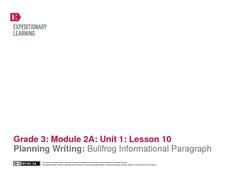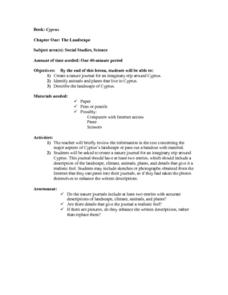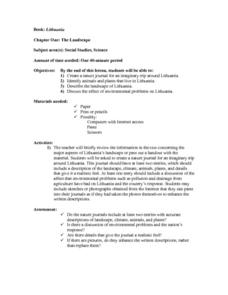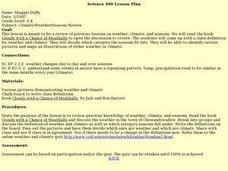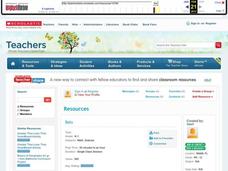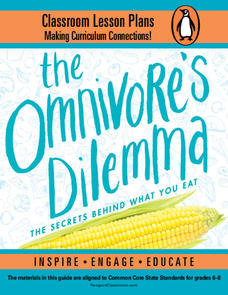EngageNY
Planning Writing: Bullfrog Information Paragraph
Lesson ten in this unit for the book Bullfrogs at Magnolia Circle, prepares third graders to begin writing an informational paragraph about the adaptations of bullfrogs. First, young writers work either independently or in pairs to...
Curated OER
Cloning Around
Review concepts of cloning and genetic engineering and participate in a round-table discussion based on the ethics and potential of cloning with your class. Each learner then writes a formal essay on the topic, stemming from the debate.
NASA
Write the Book on Weather Metrics
It's not easy to measure the weather. Pupils learn about what all weather has in common—the atmosphere. Scholars discover how a meteorologists must be able to measure aspects of the atmosphere and decipher the data. They then create a...
Jessica Winston
Tacky and the Winter Games
Helen Lester's wonderfully wacky, Tacky and the Winter Games, is the core text featured in a resource packet that includes a prediction exercise, an activity menu, vocabulary flash cards, and book review worksheet. A great way to cheer...
Curated OER
Integrating Science and Literacy Through Novel Studies
You can use "The Toothpaste Millionaire" and other outstanding fiction to integrate science and literacy.
Curated OER
Book: Cyprus
Students, after reading Chapter 1 in the book, "Cyprus," design and create a nature journal for an imaginary trip around Cyprus. They identify animals and plants that in their minds live in Cyprus as well as describe the landscape all...
Curated OER
Book: Estonia
Students, after reading Chapter One in the book, "Estonia," design and create a nature journal for an imaginary trip around Estonia. They include animals and plants that in their minds live in Estonia. In addition, they illustrate the...
Curated OER
Book: Lithuania
Students, after reading Chapter One in the book, "Lithuania," design and create a nature journal for an imaginary trip around Lithuania. They include animals and plants that live in Lithuania as well as illustrating the landscape of...
Curated OER
Log Book Guidelines
Students are given the guidelines for their log books. The log book first starts with what is the purpose of a log book. Then students have the instructions on how to organize a log book. From there student are given step by step...
Curated OER
Whale Song Acrostic
What do whales sing about? Invite your class to imagine the thoughts of whales before writing acrostic poems on the topic. The plan blends together a bit of life science with plenty of opportunities for creativity and writing.
Curated OER
Insects
It's a fact: kids love bugs! With this instructional activity, young learners explore reading informational texts and conducting research while learning about their favorite insects. Spark learners' interest by reading a book about one...
Lerner Publishing
Meet the Dinosaurs
Take your class of youngsters on a prehistoric adventure with this four-lesson series on dinosaurs. Accompanying the Meet the Dinosaurs books by Don Lessem, these lessons engage children in writing their own dinosaur books,...
Lerner Publishing
Teaching Habitats
What makes up a habitat? Use this resource to engage first graders in the exploration of desert, wetland, forest, and ocean habitats. Youngsters classify plants and animals into the four distinct habitats through drawings and cutting and...
Lerner Publishing
Living or Nonliving
It's alive! Or is it? Through a series of shared readings, whole class activities, and independent exercises children explore the difference between living and non-living things, creating a pair of printable books...
Chicago Botanic Garden
Causes and Effects of Climate Change
It's time for your class to literally show what they know! Pupils illustrate what they learned about the causes and effects of climate change by filling out a graphic organizer to complete the 5-part series of lessons. They discuss them...
Curated OER
Review of Life Cycle
Students illustrate the life cycle of a butterfly. In this life cycle lesson, students use the book From Caterpillar to Butterfly and the Internet to learn about life cycles. Students use different types of pasta to represent the...
Curated OER
The Chocolate Touch
Students investigate concepts found in the reading of "The Chocolate Touch". They research where chocolate comes from and how it is grown. While the students read the book in small groups one member of each group brings in chocolate...
Curated OER
I Just Drank George Washington's Water!
Guide your learners through the water cycle with this lesson plan. Over the course of the lesson, they read two Magic School Bus books, discuss the water cycle, come up with water facts, complete a diagram of the water cycle, recognize...
Curated OER
Playing With Science
Young scientists investigate the scientific concepts and principles that help make common toys such as hula hoops, yo-yos, slinkies, and silly putty work. As a class, they read "Backyard Rocket Science, Served Wet" to get a look behind...
Curated OER
Climate Weather Seasons Review
Students review the concepts of weather, climate, and seasons. They read and discuss a book about weather. Students collaborate on a class definition for climate and weather. They match weather to the specific season. Students...
Curated OER
Genetic Mind Reader Review Game
Students review some important concepts and terms relevant to the Human Genome Project and genetic research. The game is played like a mind reading session between two teams.
Curated OER
Bats
Young scholars investigate bats. In this animal science lesson plan, students use several websites and suggested bat books to write an informative paragraph. Young scholars should be able to write with 90% accuracy.
University of Florida
The Magic School Bus and the Electric Field Trip
Energize a shared reading of the Magic School Bus and the Electric Field Trip with this collection of supplemental materials. Whether your looking for discussion questions, reading comprehension worksheets, or writing prompts,...
Penguin Books
The Omnivore’s Dilemma, Young Readers Edition
As the saying goes, you are what you eat. A useful set of lesson plans encourage young readers to take a second look at their eating habits. Pre- and post-reading questions bring in reflective writing and discussion while extension...
